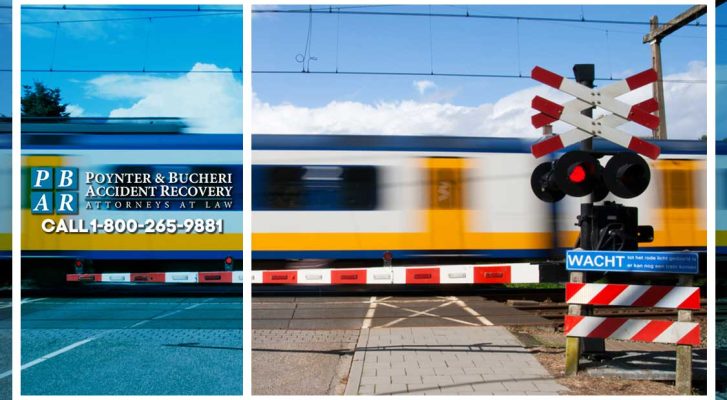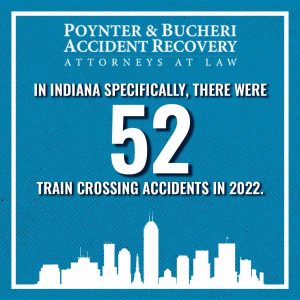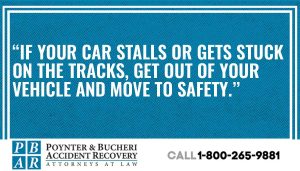
Steps to Take After a Railroad Crossing Accident


Railroad crossings are incredibly dangerous due to the speed and size of trains compared to smaller vehicles or pedestrians that might be crossing. Across the country, there are thousands of railroad crossing accidents each year, and in Indiana specifically, there were 52 train crossing accidents in 2022.
Just recently (September 12, 2023), there was an accident at IN 160 and the Clark County railroad tracks when a driver ran into a train. Another incident occurred in August when a man was struck and killed on the tracks near the Elkhart railroad museum. These are just two examples of the many accidents that occur in Indiana and across the country at railroad crossings.
If you or a loved one were injured or killed in a train crossing accident, you may be entitled to compensation that can cover your losses. At Poynter & Bucheri, our Indianapolis personal injury lawyers have years of experience handling a wide range of cases, including those involving railroad crossing accidents. Let us help you navigate your claim and build a strong case.
Causes of Train Accidents
Drivers are often responsible for train crossing accidents, such as when they trespass by attempting to cross the tracks when the barriers are down and the lights are flashing. That said, there are instances where train accidents can occur for other reasons and be someone else’s fault besides the driver who was hit. These can include:
- Faulty train equipment
- Faulty safety barriers or warning lights and signs
- A lack of safety equipment or barriers
- Train conductor negligence
- Poor train or train track maintenance
- Train derailment
- Mechanical failures
Who Can Be Held Liable for Railroad Crossing Accidents?
If a driver is hit by a train because they chose to ignore train crossing laws and warnings that a train was coming, then they might not be able to file a claim to hold anyone else responsible. However, if one of the reasons listed above caused the railroad crossing accident, then the victim or their loved ones may be able to file a claim against the negligent party. Parties that could potentially be held liable for railway crossing accidents include:
- The railroad company that owns/was operating the train
- The company or organization that owns the railroad track
- The train conductor
- The train manufacturer
- The local municipality that is responsible for the train/tracks/safety equipment
Tips for Avoiding Train Crossing Accidents
Though the train company or other third party could be held liable for a railroad crossing accident, it is still important for drivers to take extra precautions when driving around train tracks. These accidents often lead to tragic injuries and fatalities, so it’s best to be cautious when near a crossing.

Below are a few tips to keep you safe and prevent a train accident from occurring:
- NEVER cross the tracks when a barrier is in the process of lowering, is already down, or when warning sirens and lights are flashing.
- Even if a barrier is not down and the lights aren’t flashing, ALWAYS double-check before crossing.
- NEVER stop on the tracks. If your car stalls or gets stuck on the tracks, get out of your vehicle and move to safety.
- Always be vigilant by looking and listening for trains when crossing tracks.
- Even after a train has passed, DO NOT attempt to cross until the barrier has fully raised and the lights have stopped flashing. Another train could be coming if the safety equipment is still activated.
- If anything is amiss, report it to the local authorities.
What Steps Should You Take After a Railway Crossing Accident?
If you have been involved in a railroad crossing accident, your first priority should be to get yourself to safety and call for help. If you are able, call 911 and move yourself away from the tracks and the train. If you are badly injured, request emergency medical services and wait for help to arrive.
Once the police arrive, make sure you give them your statement before leaving the scene. It can also be helpful if you can gather evidence on your own, such as pictures or videos of what happened. If any witnesses saw the accident, you can also ask for their contact information in case they need to give a statement.
If possible, you should also get information about the train and crossing where you were hit, such as the USDOT emergency and identification numbers. After the accident, if you intend to file a claim against the train company or any other negligent party, you should get in touch with a personal injury lawyer.
Filing claims for train accidents is not easy, but a lawyer will know how to investigate and help you gather the evidence needed to prove what happened and hold the right party accountable. They can also ensure you are fully and fairly compensated for your injuries and other damages.
Consult With an Indianapolis Train Accident Lawyer to Win Your Case and Recover Compensation
At Poynter & Bucheri Accident Recovery, we have years of experience handling accident claims, including railroad crossing accidents. We will fight hard to protect your rights, help you navigate your claim, and ensure you are awarded the high-value settlement you deserve.
Don’t hesitate — an experienced Indiana train accident lawyer can assist you right away. Call 1-800-265-9881 for a free case review.
